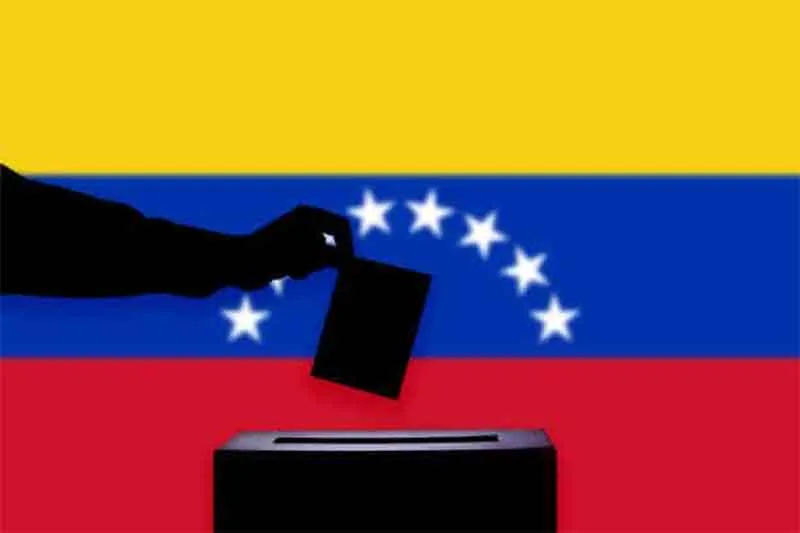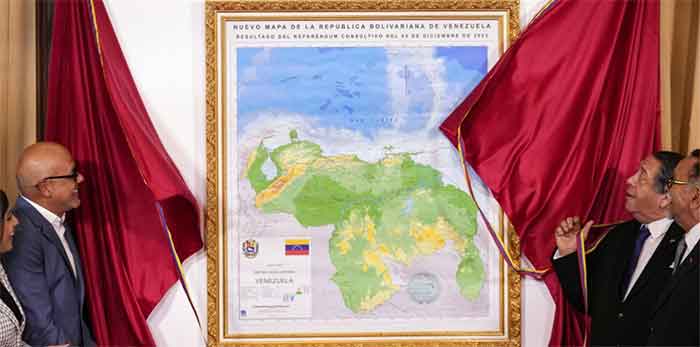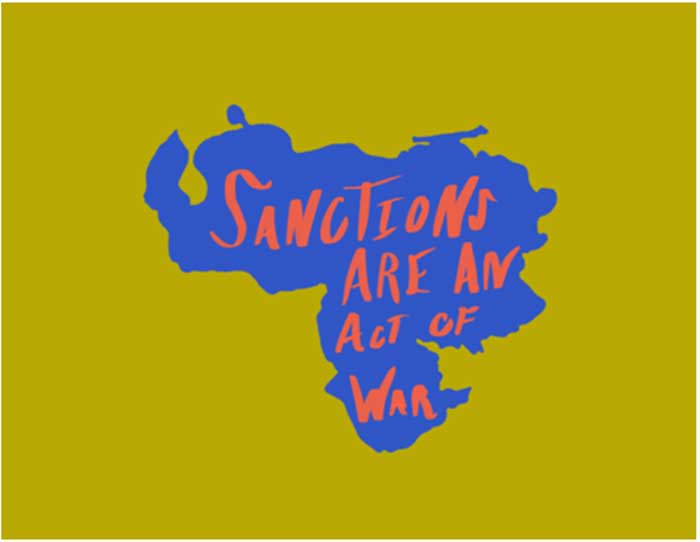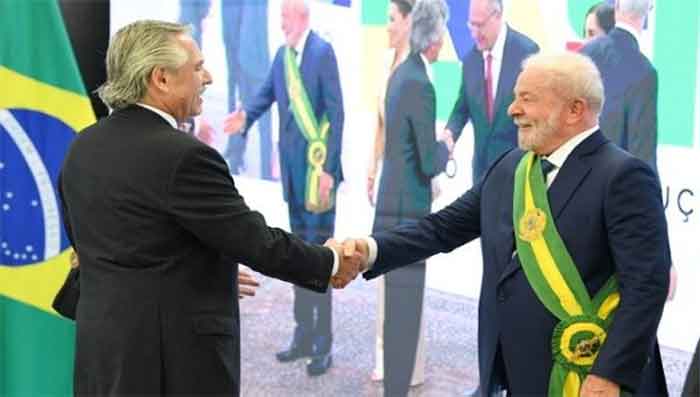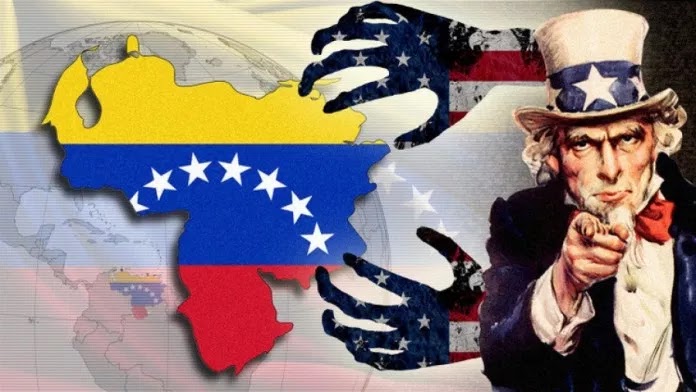
Venezuela experienced an electricity war machinated by imperialism and its proxies – the rightists, the reactionaries.
Electricity War
Venezuelan President Nicolas Maduro accused the US of waging an “electricity war” against the country, as Caracas and other cities plunged into darkness Thursday night.
Electricity supply to many parts of Venezuela snapped for a few hours. Venezuela’s 18 states reported electricity cuts and that the Caracas Metro service faced delays until the electricity supply resumed.
Thousands of commuters in Caracas had to walk home as a power outage shut down the capital’s subway, resulting in massive traffic jams. The lights went out in the largest airport of Caracas. The outage was caused by “deliberate sabotage” at the Guri hydroelectric power plant, which provides most of the country’s energy,
Authorities immediately began working to bring the electricity service back to normality.
It was an act of sabotage by the proxy warriors. President Maduro said the blackout was the result of an “electricity war” waged by “US imperialism.” Venezuela’s Ministry of Energy reported it as a deliberate sabotage of the country’s electric system.
The international imperialist media – the mainstream media – jumped on the act of sabotage, and began propagating the news as a failure while hiding the act of sabotage.
However, electricity supply was resumed within hours.
Luis Motta Dominguez, Venezuela’s Minister of Popular Power for Electric Energy, stated on Thursday that the electric system of Venezuela was attacked again on Thursday afternoon.
Dominguez denounced that this loss of power is due to sabotage in the area of electric generation and transmission in Guri, in the eastern Bolivar state.
Dominguez wrote: Venezuela has been, once again, the target of an attack in an Electric War. But here we have a strong government; they will not demoralize or defeat us. They have failed in past attempts and they will fail again.
Jorge Rodriguez, Venezuela’s Minister of Popular Power for Communications and Information, in a statement informed about the attack against the country’s electricity supply system.
Rodriguez said that the electric system in Venezuela is back up in 60 percent of the country, and it would only take a couple of hours to go back to 100 percent normality.
Rodriguez also stated that the Venezuelan right-wing opposition intended to sabotage the system for days, but have failed.
He highlighted the irony of U.S. Senator Marco Rubio tweeted about the energy loss, only minutes after it happened, “One byproduct of nationwide power outage in #Venezuela is that much of the country is currently offline with no access to cell phone service or internet coverage,” Rubio tweeted on Thursday afternoon. “Marco Rubio has failed again,” said Rodriguez, after the electric system was repaired.
Failures in interventionist ploy
Imperialist interventionist camp is experiencing failures in the acts of intervention and provocation for intervention, which performed its last show at the Brazil-Venezuela and Colombia-Venezuela borders during the last week of February. The show was with the so-called aid – a naked proof of imperialist lies.
Now, the proxy camp’s condition is surfacing through an article in The New York Times. The NYT article – “Guaido Vows a Prompt Return to Venezuela, as Unity Starts to Fray” – begins with the following question:
“What will happen to Venezuela’s opposition leader, and the movement he leads, when he returns to Venezuela?”
The opposition leader mentioned is Juan Guaido, the self-proclaimed “interim president”, who is now being mocked by persons in a number of Latin American countries – Colombia, Brazil, Peru, and Ecuador. These persons mockingly declare them as “president”, and move through city streets. As a form of protest and political satire of the current political situation, citizens in these countries have decided to declare themselves president. It is a show of shame for the imperialist powers, its lackey-governments, and their media, all of which claim as “prestigious”. A huge amount of money has been spent to build up Guaido.
The Santiago, Chile March 3, 2019 datelined article added:
“That question has been asked across South America since Juan Guaido left his country more than a week ago, defying a travel ban from Venezuela’s courts to embark on a largely improvised tour of the continent to shore up support.
“For his followers, the return can’t come soon enough, as his continued absence raises questions about the momentum of the movement he began.”
The article by Nicholas Casey cited one of Guaido’s supporters:
“‘I think it’s confused the people because it’s left us without a road map — it risks people losing faith in his project,’ said María Durán, who works at a nongovernmental organization in Caracas, the Venezuelan capital. ‘There are people who ask: What happened?’”
Guaido has returned to Caracas; but not as a hero; but as a confirmed proxy of imperialists. However, he spent time touring much of the Latin America continent, with stops in Brazil, Paraguay, Argentina and Ecuador. He had many high-profile photo sessions during the tour, which was widely covered by the imperialist media. The long tour had reaction within his camp in Venezuela.
The NYT article cited an analyst:
“‘With each additional day that Mr. Guaido spends outside the country, he further risks losing the unity of opposition parties, which have a long history of fracturing, said Geoff Ramsey, an analyst at the Washington Office on Latin America.
“‘At this point, the opposition doesn’t need another leader in exile,’ Mr. Ramsey said. ‘The more time that Guaido spends away from Caracas, the more the opposition becomes leaderless.’”
Imperialist camp was happily expecting that Venezuelan President Maduro would sent Guaido to prison immediately after his return. But that move by Maduro was absent as Maduro did not treat the proxy as a significant character. The Trump administration has threatened repercussions for the Maduro government should Guaido be jailed. Guaido’s foreign trips appeared as an effort to ensure that he was not sent to prison.
The NYT article said:
“‘He’s asking, “If I go back and am arrested, then what will you do?”’ said Alejandro Velasco, a historian of Venezuela at New York University.”
The article termed the acts of provocation at the borders as “a bruising loss over the aid shipment.”
Guaido, the article said, had raised hopes among his supporters, “with promises that an ‘aid avalanche’ would flood the country with food and medicine”
The MSM newspaper article said:
“The opposition faced further setbacks when it tried to escalate the dispute, calling for a military intervention by Venezuela’s neighbors to oust Mr. Maduro. In a meeting last Monday in Bogota, most leaders attending rebuffed the call.”
However, the article said, “the Trump administration has ruled out using the military to force aid into the country.”
It said, “the opposition is being forced to accept that the government’s rule appears to be more durable than Mr. Guaido had painted it.”
The MSM during those days in last month also carried report after report and analysis after analysis, which told, “Maduro’s days are numbered”. A few “prestigious” MSM-news providers reported that “a part of Maduro’s cabinets has fled to Turkey”. Now, the MSM do not question its performance – reports on Bolivarian Venezuela.
The NYT article cited Ricardo Reyes, a journalist in Caracas. The journalist said “your Plan A didn’t work out.”
The article added:
“Given Mr. Maduro’s continued hold, the international community is considering compromises.
“On Wednesday, the secretary general of the Organization of American States, Luis Almagro, who is one of Mr. Guaido’s chief international supporters, said he would not object to Mr. Maduro’s running for office again if a new election was free and fair. Mr. Almagro had previously joined hard-liners in demanding that the president step down.”
A version of the article appeared in print on March 4, 2019, on Page A4 of the New York edition with the headline: “Venezuela’s Opposition at Risk As Guaido Vows to Go Home”.
Acts of provocation confessed
More revelations are there as a Bloomberg report – “Heavily Armed Soldiers Aborted a Plan to Enter Venezuela by Force” – said:
Late last month, as U.S. officials joined Guaido near a bridge in Colombia, “some 200 exiled soldiers were checking their weapons and planning to clear the way for the convoy.” Bloomberg said: “U.S. officials joined Guaido near a bridge in Colombia”, and “some 200 exiled soldiers were checking their weapons”. Are these acts acceptable to “law-abiding” imperialist states at their borders?
The March 6, 2019 datelined report by Ethan Bronner and David Wainer said:
“Led by retired General Cliver Alcala, who has been living in Colombia, they were going to drive back the Venezuelan national guardsmen blocking the aid on the other side. The Colombian government, which learned of it late, stopped the plan and feared violent clashes at a highly public event it promised would be peaceful.
“Almost no provisions got in that day and hopes that military commanders would abandon Maduro have so far been dashed.”
The ploy for provocation has “so far been dashed”.
The report said: “the failed aid mission.”
The report prepared with assistance by Andrew Rosati, Ezra Fieser, and Nick Wadhams is based on interviews with U.S. and Latin American officials and Venezuelan exiles, some of whom asked not to be identified speaking about confidential matters.
The report said:
“Alcala, the retired general, did acknowledge the plan to escort the aid across the border”
The Colombians effort to avoid trouble was another aspect of the intervention-plan.
A Colombian government spokesperson, according to the report, “didn’t respond to a request for comment.”
The report said the U.S. officials who have driven the Venezuela policy – Rubio, Bolton and Abrams “continue to put on a brave face”, continues “tweeting daily about Maduro’s certain departure.”
It added:
“Behind the scenes, however, there is concern and dismay.”
“Moreover, when Guaido was in Colombia, its president, Ivan Duque, expressed frustration to him. Witnesses said Duque complained about the failure of Guaido’s promise to bring tens of thousands of Venezuelans to the border to receive the humanitarian aid.”
“There have been other concerns. Guaido was planning to make a tour of European capitals this week to build international support, but the Americans told him he needed to return to Venezuela or he’d lose whatever momentum remained.”
The intervention plan further surfaces as the Bloomberg report said:
“Despite calls for military intervention, no major government involved – U.S., Brazil or Colombia – is planning such a move. Those who oppose the idea say it’d require tens of thousands of troops and billions of dollars in a country twice the size of Iraq with both a standing army and citizen militias. But as the situation deteriorates and as hundreds of soldiers escape to Colombia, debate over targeted military operations continues behind the scenes.”
The report cited Hector Schamis, who teaches at Georgetown University and serves as a senior adviser to the secretary general of the Organization of American States. Schamis wrote a column for El Pais newspaper last week saying the country is mired in a crisis similar to the ones in Bosnia and Kosovo in the 1990s. In both cases, foreign military intervention that wasn’t approved by the UN ended a humanitarian crisis.”
Arguments for further intervention are thus prepared although Schamis said in an interview that his comments do not reflect the positions of the OAS or its secretary general, Luis Almagro. “It’s important for Latin American governments to get involved here. We are beyond the Cold War and gunboat diplomacy. This is the biggest refugee crisis in Latin American history. We need to debate all options without prejudice.”
The report cited one Latin American diplomat: “Maduro has learned from his patrons, the Cubans, about how to be resilient.”
The Bloomberg report said:
“The Latin American diplomat, who has been in contact with Washington, said the U.S. strategy seems to be to continue to provoke instability in Venezuela in hopes that Maduro will make a move that could warrant more aggressive U.S. action. Bolton and Abrams have said that arresting Guaido would prompt a severe response.”
Condition of the interventionists was told by the report:
In Europe, “trust of Trump is low. In talks at the Security Council, allies supported the defeated U.S. resolution on Venezuela only after it removed language that could have been seen to justify a military intervention, diplomats said.
“Latin American governments have officially and soundly rejected any such intervention. But several Latin American officials and Venezuelan exiles said both Brazil and Colombia are worried enough that they might be more tempted by a quick military operation that removed Maduro in the coming months if nothing changed.”
Interventionist acts have not ceased. It should not be expected that these acts would cease in future.
German ambassador: persona non grata
Venezuela declared German ambassador in Caracas Daniel Kriener persona non grata Wednesday after “recurrent acts of meddling in internal affairs”.
The diplomat was given 48 hours to leave the country.
Kriener is one of the few European representatives that were present on March 4 in airport to receive Guaido after a tour to several regional countries.
After that, and according to EuroPress, Kreiner met with Guiado this Tuesday in the residence of Spanish Ambassador in Caracas, Jesus Silva, where diplomats from France, Portugal, Romania, The Netherlands, United States, Canada and Chile were also present.
“The activities that Mr. Kriener has undertaken, not only contravene essential norms that rule diplomatic relations but even contradict the clear criteria expressed by the German Federal Parliament’s judiciary service, which established that the position of the German government constitutes a hostile and unfriendly act of “illicit meddling” in internal affairs”, said an official statement tweeted by Jorge Arreaza, Minister of Foreign Relations of Venezuela.
World Unions’ solidarity
The World Federation of Trade Unions (WFTU) in its 14th Congress of Transport, Communication and Fisheries Unions (TUI) in Istanbul, expressed their support for Venezuela. Union representatives from 30 countries backed Venezuela.
WFTU Secretary-General, Yorgos Mavrikos, presented the “Hands Off Venezuela” campaign to the delegates, and urged them to make a call for solidarity with Venezuela that faces aggression by the United States, and some countries led by right-wing governments, allied to the U.S.
Over 80 representatives were part of this conference to “stop the imperial attack that spends millions of dollars in favor of anti-union policies throughout the world” said the president of the WFTU, Ali Riza.
According to Mavrikos, an international campaign supporting Venezuela was organized. Numerous organizations from around the world have participated in activities that have been carried out under the banner “Hands Off Venezuela!”
According to the organization, “Militant trade unionists have responded to the WFTU call for solidarity with Venezuela, within the framework of its international solidarity campaign. In many corners of the world, our class brothers and sisters said that ‘peoples themselves have the right to decide on their own present and future’.”
The WFTU Secretary-General defended democratically elected President Nicolas Maduro, and rejected Guaido.
The union leader said, Venezuela “only has one president, that was elected, and it’s Nicolas Maduro while Guaido is a puppet of imperialism.”
“We know very well what (their) democracy and freedom means,” he said, adding that “in the face of imperialist aggressions we need internationalist solidarity.”.
The meeting decided to intensify the organization’s support for Venezuela and Cuba, nations that face “imperial” aggression.
UNHCR warned
Freddy Bernal, a socialist leader and protector of the Venezuelan state of Táchira, warned that the UNHCR, the UN organization for the Refugees, might be providing funds to “irregular groups” that intend to attack Venezuela.
In an exclusive interview for teleSUR, Bernal urged the UN agency to decide on whether to collaborate with armed groups that intend to take action against Venezuela.
However, he said the government and Venezuelans in support of President Maduro were grateful for the position of the UN as a whole in that the body made it clear it would not participate in the interventionist agenda of the United States and reaffirmed its recognition of the elected government of President Maduro.
Bernal also warned that the U.S. is moving towards a new form of war against Venezuela. “A new form of war is being prepared, internal chaos through paramilitaries and irregular groups through attacks on police installations, security and selective assassinations of political and military leaders,” said Bernal.
During the interview, Bernal reiterated the denouncements made by the Venezuelan Vice President Delcy Rodríguez, and Ambassador of Venezuela to the UN Samuel Moncada in which they warned of the creation of a so-called “army of liberation” by the Venezuelan right-wing opposition
Bernal’s appointment as a protector of Táchira by President Maduro year ago made him head of the security staff at the state’s border region with Colombia given that it is an unstable border area due to smuggling and drug trafficking.
Rubio’s false claim and sex-robbery
U.S. Senator Marco Rubio blamed Maduro when an opposition lawmaker and his aide were “poisoned” on the Colombian side of the border.
Despite lack of any evidence, the MSM ran with the story.
But it turned out the assembly member was apparently drugged and robbed by sex workers he had brought to his room after a night of partying.

